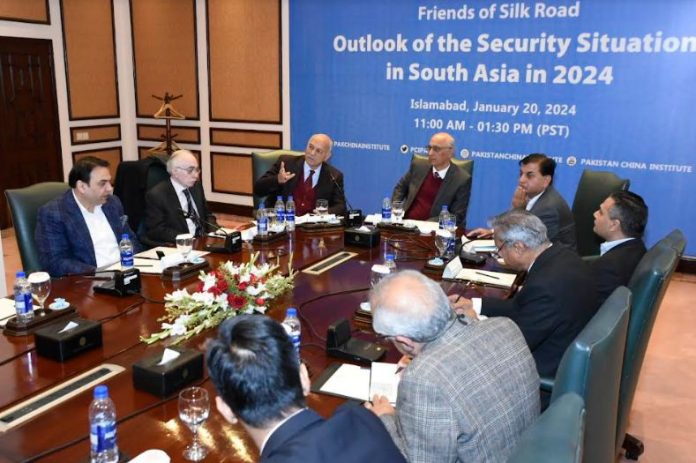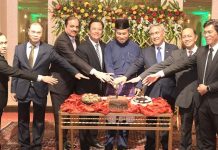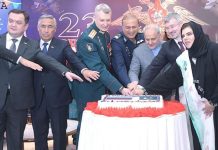Iran crisis resolution ‘model of crisis management’, Non-state actors are threat to regional security, national security now linked to regional geopolitics, says Mushahid
Mahnoor Ansar/DNA
ISLAMABAD, 21: Pakistan-China Institute, under Friends of Silk Road (FOSR) Initiative? organized a dialogue on “Outlook of Security Situation in South Asia in 2024.” The event took place simultaneously at two venues: Islamabad, and a second venue at Quetta Press Club. The dialogue featured speeches by Senator Mushahid Hussain Sayed, Chairman, Senate Defense Committee Defense & Pakistan-China Institute; Senator Mohammad Abdul Qadir; Lt. General (r) Muhammad Afzal, Former Chairman NDMA & DG FWO; Amir Rana, Director, Pak Institute for Peace Studies (PIPS); Ambassador Sohail Mahmood, Director General of Institute of Strategic Studies, Islamabad (ISSI); Ambassador (r) Masood Khalid, Former Ambassador to China; Sultan M Hali, Security Analyst; Shahzada Zulfiqar, former President, PFUJ, and Mustafa Hyder Sayed, Executive Director, Pakistan China Institute. The dialogue was chaired by Former Pakistan Ambassador to China, Moin ul Haque.
In his opening speech, Senator Mushahid Hussain Sayed highlighted the significance of the current scenario, dominated by turbulence and transformation. In tjis context, he analysed China’s Global Security Initiative (GSI) as a new framework for peaceful resolution of security issues, since GSI focuses on security as being indivisible, based on respect for sovereignty and territorial integrity of states. It seeks also to promote a security governance framework, including A.I., cyber security and related security threats based on accepted international norms of behaviour enshrined in the UN Charter and international law. He strongly condemned the ongoing Genocide and Crimes against Humanity in Palestine by Israel. Delving into security issues, he discussed three new realities: the shattering of the Middle East status quo after October 7, serious challenges posed by Non-State Actors, and the complex security situation between Iran, Pakistan, and Afghanistan which is now inextricably intertwined with regional geopolitics, necessitating dialogue and diplomacy. Senator Mushahid Hussain termed the swift and smooth resolution of the Iran crisis as ‘model of crisis management and crisis resolution’ adding that the two crises, Pulwama 2019 (with India) & Panjgur 2024 (with Iran) had helped Pakistan in establishing certain ‘regional rules of behaviour based on our red lines in our troubled neighbourhood’. He said ‘Iran is not India, but a brotherly Muslim neighbour with which Pakistan has no fundamental conflict of interest’. In this regard, Senator Mushahid Hussain especially praised the Pakistani leadership for their deft handling of the Iran crisis, maintaining a mature and measured, cool and calm approach, while avoiding jingoism. Regarding relations with China, he said ‘we stand with China because China supports Pakistan without reservations at all times on all our core interests, and Pakistan too supports China on all its core interests, actually, our position on China is historically correct and consistent as Pakistan is on the right side of history’. Senator Mushahid Hussain also quoted verses from Allama Iqbal, 90 years ago, predicting the resurgence of Asia and rise of China.
In his speech, Senator Mohammad Abdul Qadir emphasized the urgent need to address the economic challenges facing Balochistan. Highlighting the province’s high poverty rate, unemployment, and wealth disparity despite rich resources, Senator Qadir stressed the importance of responsible resource management and equitable development. He underscored the transformative potential of Gwadar Port, citing Chinese investments in infrastructure that have already fueled economic growth, job creation, and increased trade. He cited tourism as a factor in development and growth.
Lt. General (r) Muhammad Afzal, Former Chairman NDMA & DG FWO, delivered a PowerPoint presentation on “Western Route-CPEC opportunities for development and stability.” The presentation explored the China-Pakistan Economic Corridor (CPEC) and areas of interest for both nations. The analysis highlighted achievements in road infrastructure and power generation under CPEC but emphasised the need for prioritising rail, addressing immediate concerns in water storage and IT infrastructure, and role of privates sector.
Muhammad Amir Rana, Director of Pak Institute for Peace Studies (PIPS), underscored the pivotal role Baluchistan plays in the economic development of the country, given its strategic location on classical routes connecting Asia, East Asia, and Central Asia. In addressing the global North-South divide mirrored in Pakistan, Rana attributes it to inherited administrative systems from British colonial era. Rana emphasised the shared objective of redressing wrongs of the past and upholding rights of the local communities in Balochistan, advocating for a focused resolution to address long standing demands. He regretted that ‘no attempt at reform’ had been made by Pakistan especially in neglected areas like Balochistan and Gilgit-Baltistan.
In his address, Ambassador Sohail Mahmood, Director General of the Institute of Strategic Studies, Islamabad (ISSI), emphasized the paramount importance of Pakistan’s unwavering relationship with China, ‘since China is a trusted friend’. Shedding light on the Belt and Road Initiative (BRI) and CPEC, which he underscored ‘addressed key deficits in development and energy’. Ambassador Mahmood also highlighted that President Xi Jinping’s GSI was ‘an alternative paradigm promoting peace building in a world becoming more dangerous’.
Ambassador (r) Masood Khalid, former Ambassador to China, highlighted CPEC’s transformative journey for Pakistan. Reflecting on the challenging security situation in 2013 that deterred all foreign investors, he underscored China’s groundbreaking investment through the CPEC as it was then the only country willing to invest in China. Ambassador Khalid’s remarks shed light on how China’s commitment has defied skepticism, reshaping Pakistan’s economic landscape and fostering a new era of collaboration.
Sultan M Hali, renowned Security Analyst and author of seven books on China, dispelled various conspiracy theories surrounding China, the Belt and Road Initiative and CPEC. He referred to a 1976 Survey of mineral and natural resources of Balochistan which could be useful in mining and exploration. Emphasizing that CPEC stands as a guarantor of Pakistan’s prosperity, Hali highlighted the nation’s capability to diligently undertake necessary preparations and leverage opportunities within the framework of CPEC.
In speeches by journalists from the Quetta Press Club, highlighted the critical role of the media in shaping public perceptions of the security situation in Balochistan. Shahzada Zulfikar, former President of Pakistan Federal Union of Journalists (PFUJ), Nurul Haq Bugti and Daniyal Butt, urged the government to pay special attention to the common people of Balochistan, especially the youth’, ‘hold fair and free elections in Balochistan’, and instead of ‘slogans and promises, government should eliminate bad governance and corrupt practices’ so that a conducive environment be created for successful development of CPEC.
In his closing remarks, Mustafa Hyder Sayed, Executive Director of the Pakistan-China Institute (PCI), expressed gratitude to all speakers. Emphasizing the significance of 2024, especially for Pakistan and CPEC, Mustafa Sayed stressed the need for constructive discussions to improve CPEC outcomes. He announced the forthcoming release of a report by PCI, based on the Seminar, providing insight into the needs of Balochistan’s stakeholders, especially the people of the province, and proposing a way forward in the context of security challenges which would serve as useful input for policymakers.
Around 100+ participants consisting of media, civil society, parliament, and academia participated in the dialogue. The dialogue also featured a candid and insightful Questions & Answers session.












